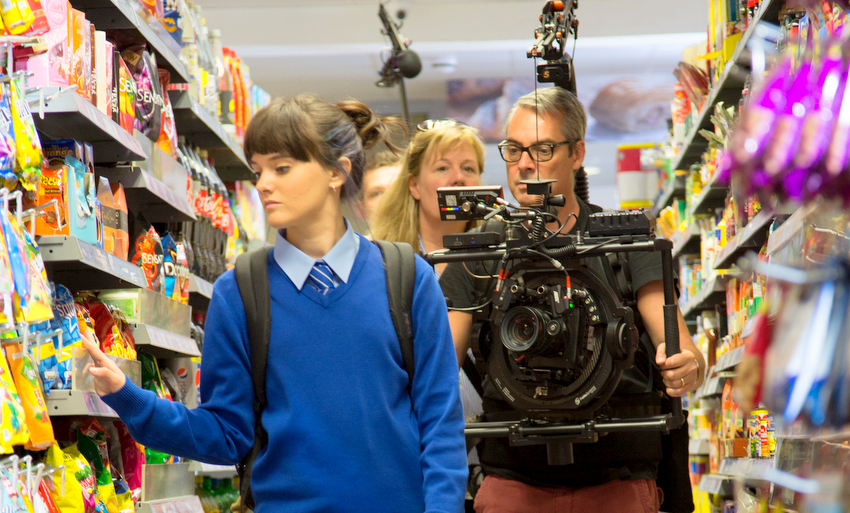
What Happened to Evie
indieactivity: Give a background of your personal experience with the story, writing, production and marketing
Kate Cheeseman: The short was written by Carol Younghusband. She was passionate about the story because her friend had been assaulted at school and never dared tell anyone. Carol wanted to write something to encourage people in this position to come forward and be able to talk about it without feeling shame.
She wrote it before the #MeToo movement, but it is incredibly relevant to everything happening now and also gives viewers a chance to question other destructive behaviour which we often accept but which also undermines women’s confidence. It’s also a really important debate to have and yet we also have to be really careful that a lot of people don’t turn off. So, one of the things I loved about this script was that it wasn’t on the nose with its message but instead gives people the chance to discuss issues.
I came on board because I loved the script and the team. I helped finesse the screenplay, mainly to make the film work visually and fit with the locations we had. I also wanted to tell the story from the heroine’s point of view, make sure it was not voyeuristic and that the lead was comfortable. Hence things like our heroine keeps her clothes on in the bath. I felt like I’d seen a million post-assault naked bath/shower scenes, so I felt it made it a bit different too. It fitted with how she was feeling in the story and was less intrusive. Similarly with the assault, we wanted to feel like we were in our heroines position, not watching her from outside.
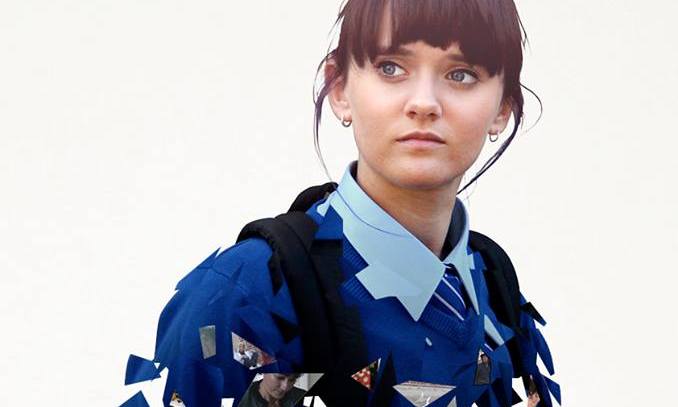
We are just in the marketing phase. I don’t mind Twittering, posting on social media and doing interviews, but I do think the number of live interviews you have to do with a full feature film must be tough work for everyone to stay fresh however necessary it is. Most film makers want to make films, so it’s always hard to do things that take you away from that. However, we also all want people to see our work!
indieactivity: Did you start writing with a cast (You or any) in mind?
Kate Cheeseman: In this case we cast the script completely from scratch with the help of our casting director Emily Jones. Mike Jibson was a Facebook friend of Georgina’s, I think from drama school. He only found out about his part in Hamilton on the first day of our shoot, but he is a brilliant actor anyway and has a great voice. Emily had seen Bessie Coates in her graduation show and thought she was amazing.
Her film mother is her real-life mother which is why some bits of the film are so realistic! Sian came on board to help Bessie and of course is great too. The young guys in the film were all actors we chose after seeing a whole lot of people. They are the all opposite of the characters they play, really polite and lovely guys.
indieactivity: How long did you take to complete the script? (Do you have a writing process?)
Kate Cheeseman: Carol wrote the script a couple of years ago and it had won a few competitions and was meant to be filmed for one of those, but everything fell through with the filming. However, Carol and Georgina managed to raise some money themselves and I am very glad that I got to direct it instead of someone else!
What Happened to Evie – Trailer Dir: Kate Cheeseman from Robert Shacklady on Vimeo.
indieactivity: When did you form your production company – and what was the original motivation for its formation?
Kate Cheeseman: Georgina French is an up and coming producer who has made a number of shorts and starting to make features, one with me. She used to be an actress so has a great understanding of scripts and casting in particular. She formed the company to make films as the next stage in her career. I work with a number of producers and she is one of them. Maybe one day I will form my own company, but at the moment I am concentrating on directing.
indieactivity: What was the first project out of the gate?
Kate Cheeseman: The first short film I directed was a comedy horror starring Phil Davis about a guy who eats roadkill but then gets lured into a badger cult and ends up as roadkill. I learn a lot from the 4 shorts I have made and hope they have got better and better. Roadkiller was listed as one of the top thrillers to see at Aesthetica Film Fest a few years ago.
indieactivity: During production, what scene (that made the cut) was the hardest to shoot?
Kate Cheeseman: We had such a tight schedule for the shoot that we rehearsed most scenes and I storyboarded everything. There are no lost scenes and I think we used most major shots, though we had some to spare in the action scenes. The rape was choreographed with the help of a fight coordinator as I wanted everyone to be and feel safe.
Scenes like this can take for ever if actors don’t know what they are doing physically, so it’s really important to work that out to free them to act the emotions. Otherwise those scenes will eat time and can be eggy too. The bathroom was tricky because it was a really small space, but probably the most complicated scenes were the ones with the guys in, only because we had rented the area from the council and we only had two hours to shoot a huge amount of material which was all quite complicated with lots of movement. I would have liked to do a few more shots, but we did enough!
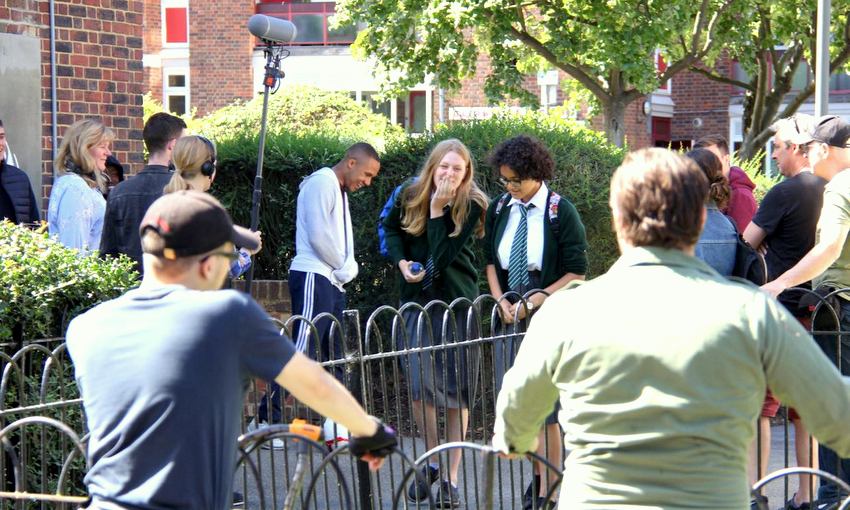
What Happened to Evie
indieactivity: What works better in this latest production that mightn’t have worked so well in the last one you did?
Kate Cheeseman: My last production was so different, that it is difficult to compare the two. It was an adaptation of a versed performance piece. It was much more experimental but gave me lots of opportunities for great visual images. Evie is more realistic, gritty and edgy, so the cinematography had to feel real and inside her head. My previous film was also shot in Wales over a week, and half our crew were students. They were all absolutely brilliant and 100% dedicated, but they were a tiny bit slower than a professional crew which you would completely expect.
We were also dealing with Welsh weather which changed from tropical to arctic in minutes! Then on top of that we were shooting in areas where the tide came up or down really fast. It’s a stunning place to shoot but we did get a lot of rain and wind and sea water, therefore had to change a lot of locations to cope with that. With Evie we got brilliant weather, and all went well on the shoot days. The only little problem was when the lights in the underpass all came on an hour earlier than they had the day before, so we had to temporarily tape them all over which took forever! #101uses4Gaffertape
indieactivity: You produced and directed the film, what measure of input did it take to don these hats?
Kate Cheeseman: I have produced and directed in the past, but I didn’t on this and would never choose to! It’s really difficult to oversee and be in the moment with the actors and crew. I don’t mind helping with some of the production beforehand, like helping find backers or working on the budgets and schedules. However, I much prefer working with a producer.
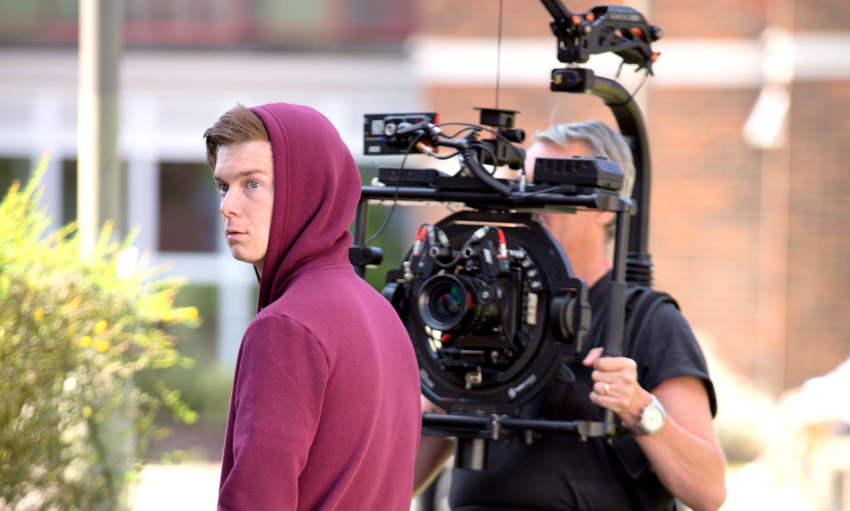
What Happened to Evie
Georgina was fantastic as she helped support us all and managed the team brilliantly. I like to have a producer that will both challenge and support me, an extra pair of eyes for those moments when you need them, but who also lets you be creative. Both of us are progressing to making full-length feature films and I think Georgina has the determination and skill to be a great producer who I hope I will have a continued relationship with.
indieactivity: Is there anything about the independent filmmaking business you still struggle with?
Kate Cheeseman: I love all aspects of directing but am not that keen on the raising the money part. I have two features we need development money for, in order to pay the writers and develop the scripts to a state we are happy to send out to potential cast.
That is really difficult, as I feel I can’t spend my life always asking people to do things for free, but it is very difficult to get any money without an amazing script already written and several A list stars attached. As there are so few actors who can finance a film, it seems everyone is chasing the same 10 men and women who can finance a film. Personally, I believe a good script is vital for a good film, so the most important part is often the most difficult to get financed.
If you are out there and want to work on a great female led feature, call me!
indieactivity: Where do you think your strengths lie as a filmmaker?
Kate Cheeseman: I learnt about film from the grassroots up, so though I have never been to film school, I grew up with actors and then learnt how to edit before working my way up to directing fiction. I think that gives me a very good overview of many different departments. When making Evie, I ended up editing it too, which again is not ideal, but I can do it! I also love working with actors and creating something together.
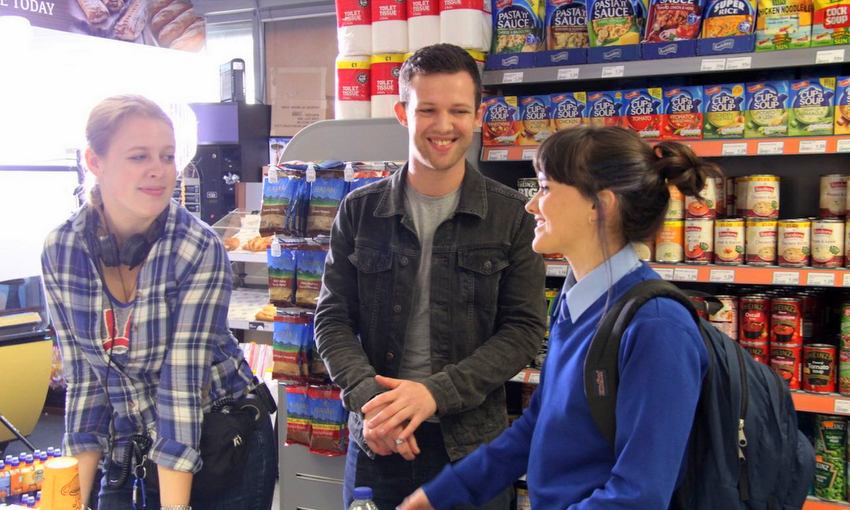
What Happened to Evie – Evie, boom operator and first AD
Someone told me they hated the shooting days, but I love them as it is so creative and the moment when everything comes together. I’ve also got far better at dealing with changes than I was at the very beginning of my career and in my last two films all the things that fell through and had to be altered, led to something so much better. The only bit I really don’t like is waiting around when a lighting set up takes a long time. I also love the cutting room when the whole film comes together in a different way.
indieactivity: Let’s talk finance, How did you finance the film?
Kate Cheeseman: Ha ha! The writer and the producer financed the main part of the film and I have never asked about it, apart from that it wasn’t very much! However, it was enough to pay everyone minimal wages. We also received lots of favours from people like Arri helping us with the equipment and Round Table with the post. Then we applied to Stefan Allesch who has a fund to improve diversity in short films. That gave us enough money to fund some of the post and things like music and the poster. However, it was a very tight budget which I have to say is normal for shorts and of course I would like more money! Though sometimes limitations make you more creative.
indieactivity: How much did you go over budget? How did you manage it?
Kate Cheeseman: We didn’t! I’ve worked in series TV and you quickly learn that you have to hit your schedules. I remember working on one series and because I shot the first episode tightly, they gave me too long a script on my next block! Now I’d be there going, “Cut this down or we won’t do it justice!” “It’ll all end up on the cutting room floor!” etc. Lots of things are bargains or compromises about where you spend your money. With Evie, we finished bang on time and Georgina was very careful with the funds, so we didn’t go over budget.
I compromised on one location, but we spent more on another to get the place we wanted. We would have had to pay with our own money for a few extra things like festival applications if it hadn’t been for the short film fund finance we gained. We also won £500 in Cannes Short Film Corner care of Papaya Film Fund, so that will pay for a few more entries and maybe a cast and crew screening?
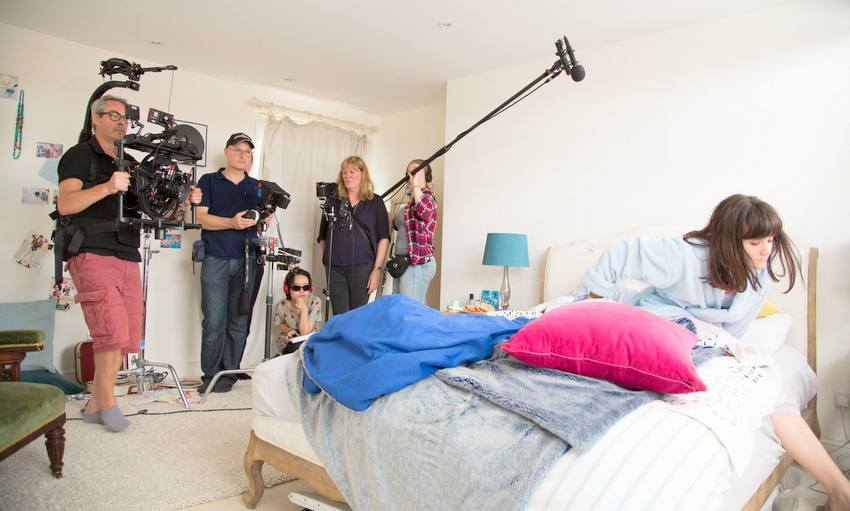
The whole short film funding and festival entry process is incredibly expensive and going to the festivals even more so. I managed to get to Galway Fleadh but am not sure how many more festivals I can afford to visit, which is a pity as it is great seeing your film screened in front of an audience.
indieactivity: How important is marketing? Do you think a project can make any dent without it these days?
Kate Cheeseman: Of course, marketing is very important, how much so though I really don’t know. I’d like to think less than is probably the case! However, you need a good film too. When a festival receives 1000s of entries, I am not sure everything always gets watched properly by a variety of people, so in that case your film needs to really stand out to be noticed.
You also have to fit in with their programme. However, if a festival says they had 10,000 entries and they still only managed to screen 15% of films directed by women, then I see the selection board is all male, it does make me wonder! Some of the big festivals watch films two or three times with different selectors which is great, so you know selection is fairer. Then possibly publicity is less crucial. At the end of the day though, nobody wants to miss out on a great film that people are talking about. So being talked about always helps.
indieactivity: Can you tell us about your marketing activities on the project – and how it’s gone for you?
Kate Cheeseman: We’ve only just started our festival run and marketing. Our script writer used to work in PR so she is pretty good at posting things, which spurs me on to post and repost. In addition, we were picked up by tNC at Cannes and also the new wave district almost immediately, which was fantastic. Now with winning Best International Short at Galway, I am hoping the film will pick up some steam.

indieactivity: What do you hope audiences get from your film?
Kate Cheeseman: At the Galway screening there was lots of incredible feedback from the audience and other film makers, one fellow director really got my direction, so that was lovely hearing him talk about it as there were lots of subtle things I had done which he completely saw and I didn’t think anyone would notice! The audience said the film made them think about their assumptions and also I think because of how we shot the film, it made people think about all sorts of behaviour to women. That is all really positive as the idea was to open up a discussion and make people think.
indieactivity: What else have you got in the works?
Kate Cheeseman: I’m working on two feature films and have several other projects in early stages. At the moment we are looking for development finance which is the trickiest as I said above, whilst doing as much as we can ourselves. I am also going to direct some television as I need to earn some money, plus television is so good these days!
Follow Kate Cheeseman on social media
Website
IMDb
Facebook
Twitter
LinkedIn
Wikipedia
Vimeo
In Camera by Naqqash Khlalid Launch on VOD April 29
Naqqash Khlalid’s Directs Nabhan Rizwan. In Camera stars an EE BAFTA Rising Star Award Nominee.
2025 Philip K. Dick Sci-Fi Film Festival Award Winners Announced
Vanessa Ly’s Memories of the Future Awarded Best PKD Feature
Dreaming of You by Jack McCafferty Debuts VOD & DVD for April Release
Freestyle Acquires “Dreaming of You” for April 15th Release
Hello Stranger by Paul Raschid set for London Games Festival & BIFFF
The film Is set for an April 10th Premiere at The Genesis Cinema in London (LGF) and BIFFF
Daydreamers Official Trailer by Timothy Linh Bui: Released by Dark Star Pictures
Daydreamers Vietnamese Vampire Thriller – May 2nd release
Afternooner by The Harrow Brothers: Funniest Movie of the Decade on VOD & DVD April
Freestyle Acquires “Afternooner” for April Release









